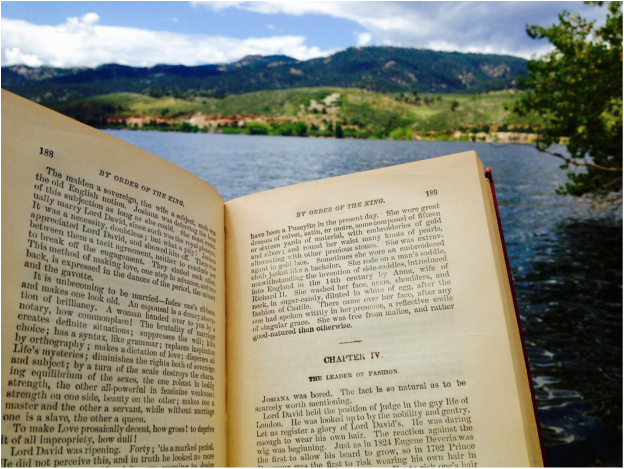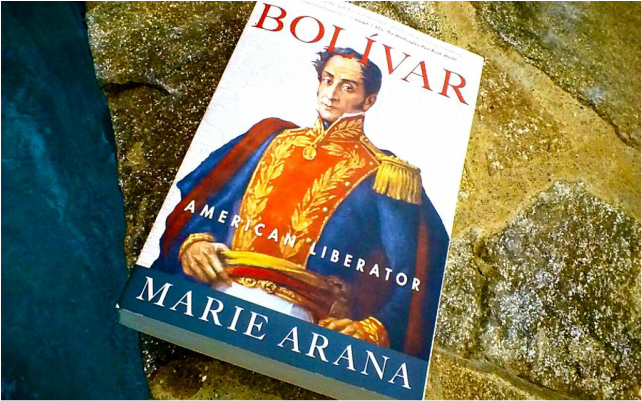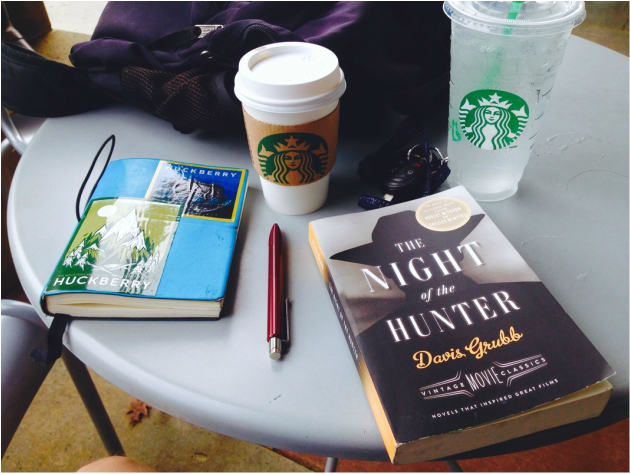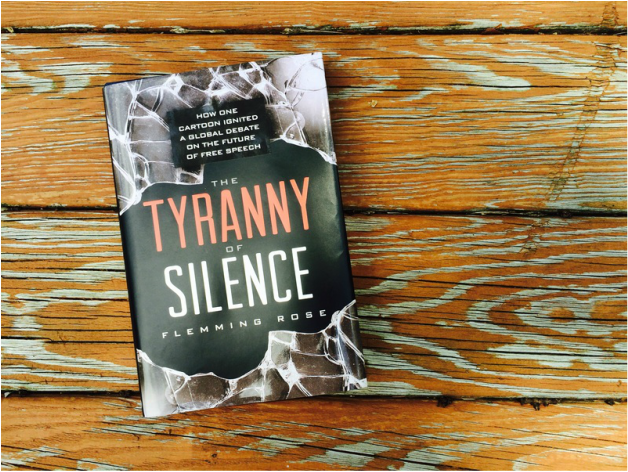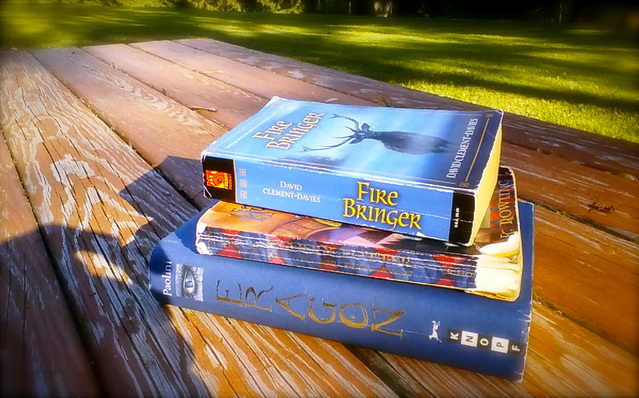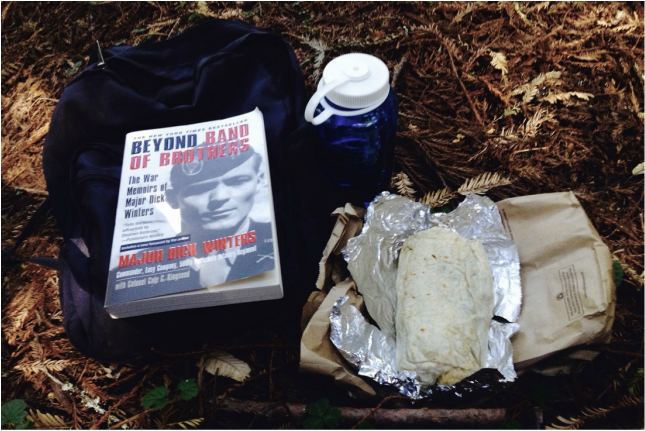When I interviewed Kevin Costner last month about his new book, I asked him what he thought were the main ingredients of a good story. His answer really struck me:
"A careful choice of settings, the creation of challenges, the architecture of dilemma...secrets and mystery, and the willingness to hold back information until the right time...I love it when the author is willing to look around before pushing on and advancing..."
I've always loved this 'looking around' too, as well as diverse settings and experiencing a character overcome a unique obstacle. I think you'll find all that in my 10 favorite reads of 2015. Whether it's fiction or nonfiction or both, I trust that you'll find something on my list below that might spark your interest and even influence your life's direction. They've all left their mark on me.
The first is my genuine #1 bar none. The rest rise and fall but have stayed in mind and sight — and I imagine will earn a couple of re-reads, Post-Its, and more highlighting over the years. I hope you get as much out of them as I do, whether you pick up one or two or ten of them, let me know!
Happy reading and a happy New Year!
"A careful choice of settings, the creation of challenges, the architecture of dilemma...secrets and mystery, and the willingness to hold back information until the right time...I love it when the author is willing to look around before pushing on and advancing..."
I've always loved this 'looking around' too, as well as diverse settings and experiencing a character overcome a unique obstacle. I think you'll find all that in my 10 favorite reads of 2015. Whether it's fiction or nonfiction or both, I trust that you'll find something on my list below that might spark your interest and even influence your life's direction. They've all left their mark on me.
The first is my genuine #1 bar none. The rest rise and fall but have stayed in mind and sight — and I imagine will earn a couple of re-reads, Post-Its, and more highlighting over the years. I hope you get as much out of them as I do, whether you pick up one or two or ten of them, let me know!
Happy reading and a happy New Year!
The Man Who Laughs by Victor Hugo
As ya'll know, I love me some Victor Hugo. Especially Notre Dame de Paris and Ninety Three. His characters are larger than life and his themes are universal. Timelessness is what he aims for and, I think, achieves. The fact that his works are still in print and bestsellers 150+ years later is relevant. It's a clue that he's speaking about relevant, timeless, important things. Even if I disagree with his politics and fervor for a sort of nuanced, modernized Christianity, I adore his passion for storytelling; plotting, and grappling with complex subjects. He drawing heroes and villains and those in-betweeners with such clarity and style, that he makes the modern section of any Barnes and Noble the most disgusting and boring place to find yourself. And I've been in some pretty gross public restrooms in my travels...
The Man Who Laughs was the last novel of his that I tackled. And it did not disappoint. I went into it completely blind. The only knowledge I had of it was that A. It took place in England and B. It was Ayn Rand's favorite work of Hugo's. (Rand is one of mine). I'll just say that if you can, read the first hundred pages or so by a body of water. And the last 100. It will give the work — and its theme — a greater, visceral meaning. At least, it did for me. Pictured above is my favorite reading perch on a cliff in Montara Beach. Just me, my 115 year old copy of The Man Who Laughs and endless water.
You can read my full recommendation here.
The Man Who Laughs was the last novel of his that I tackled. And it did not disappoint. I went into it completely blind. The only knowledge I had of it was that A. It took place in England and B. It was Ayn Rand's favorite work of Hugo's. (Rand is one of mine). I'll just say that if you can, read the first hundred pages or so by a body of water. And the last 100. It will give the work — and its theme — a greater, visceral meaning. At least, it did for me. Pictured above is my favorite reading perch on a cliff in Montara Beach. Just me, my 115 year old copy of The Man Who Laughs and endless water.
You can read my full recommendation here.
Bolivar: American Liberator by Marie Arana
On August 15th, 1805, nearly two hundred and ten years ago to the day, a young nobleman from Caracas climbed Italy's Mount Palatino. He shared the trek with his two best friends, one of whom was recounting a previous journey up the mountain one millennium earlier, in 494 B.C. by Roman plebeians. The plebeians did so in order to confront a tyrannical patrician ruler, voicing threats of secession from the empire. Perhaps inspired by his friend's tale of ancient freedom fighters, the young man cast aside the sting in his legs and finally reached the summit, and a slab of white marble atop it. Then, the young man wrote, "we all knelt down, embraced, and swore that we would liberate our country or die trying." Fourteen years later, the young man did.
Simon Bolivar was the George Washington of South America. His life's battle against monarchical Spain for the soul of the (southern) New World is one of the most harrowing and inspiring stories I've come across in years. Marie Arana's biography of El Libertador is a treasure, one that I left with a sense of bittersweet nostalgia. Bolivar's idealism, passion, and purpose is so grand that I feel cheated by public education, having never once heard his name in dozens of history classes.
Though his flaws as a political leader damaged much of his life's project, Bolivar's dogged commitment to freedom, and mastery of military strategy, ended 300 years of Spanish oppression, and replaced it with The United States of South America, a confederation of free republics, if only for a time. Including Venezuela, Peru, Chile, and what was then New Granada, Bolivar's desires for his home continent were in some areas more enlightened than his North American neighbors. Universal suffrage and the complete abolition of slavery were primary concerns for Bolivar from the outset, which he incorporated into his constitution, and which his lessers would ultimately compromise on.
If you're looking for an epic tale of a largely unknown freedom fighter, an idealistic man of action, this is it.
Simon Bolivar was the George Washington of South America. His life's battle against monarchical Spain for the soul of the (southern) New World is one of the most harrowing and inspiring stories I've come across in years. Marie Arana's biography of El Libertador is a treasure, one that I left with a sense of bittersweet nostalgia. Bolivar's idealism, passion, and purpose is so grand that I feel cheated by public education, having never once heard his name in dozens of history classes.
Though his flaws as a political leader damaged much of his life's project, Bolivar's dogged commitment to freedom, and mastery of military strategy, ended 300 years of Spanish oppression, and replaced it with The United States of South America, a confederation of free republics, if only for a time. Including Venezuela, Peru, Chile, and what was then New Granada, Bolivar's desires for his home continent were in some areas more enlightened than his North American neighbors. Universal suffrage and the complete abolition of slavery were primary concerns for Bolivar from the outset, which he incorporated into his constitution, and which his lessers would ultimately compromise on.
If you're looking for an epic tale of a largely unknown freedom fighter, an idealistic man of action, this is it.
The Night of the Hunter by Davis Grubb
Set in rural Ohio during the Great Depression, The Night of the Hunter tells the story of brother and sister John and Pearl. They lose their father to his life of crime at the novel's outset, and soon a shadowy figure named Preacher, a wolf posing as a shepherd, comes to their mother feigning romantic interest. In truth, he's gunning — or more accurately, knifing — for dead dad's loot. Paying time for a strong of past cons, Preacher had shared a cell with John and Pearl's dad, but was unable to ascertain the whereabouts of his unrecovered ten thousand dollars. John and Pearl both know where it is, and Preacher knows they know...
You can read my full recommendation for it here.
Oh, and there's a movie. It's phenomenal. Completely hated at the time of its 1955 debut, the film has gained cult classic status — and rightfully so.
You can read my full recommendation for it here.
Oh, and there's a movie. It's phenomenal. Completely hated at the time of its 1955 debut, the film has gained cult classic status — and rightfully so.
The Tyranny of Silence by Flemming Rose
I tore through this one in two days and I knew immediately that it was the most important book I had read this year so far. As a writer, I take freedom of speech extremely seriously. That's why I interviewed a cartoonist who was attacked in Garland, Texas recently because he drew a picture, why I interviewed a philosopher who has had a huge impact on my thinking through his teaching and writings. That's why after I finished this book, I called Flemming Rose and had a two hour interview with him about free speech, hate speech, Islam, and globalization. It's not because I like talking about politics; in fact I hate it. It's because I love books - reading them, writing them. I want to keep reading them and writing them. And at the end of the day there are people out there that want to censor or worse kill artists.
During my interview with him, Rose said, "There is no society that protects freedom of religion more than secular democracies, because in societies where one religion rules, different viewpoints will be labelled as heresy and blasphemy. Why? Because the society is built on religion—not freedom for all points of view. In many Islamic countries you receive the death penalty for blasphemy or apostasy. For instance in Pakistan, the crime for blasphemy is being treated exactly the same way as the crime of terrorism. If you kill 500 people you will receive the same sentence as if you criticize a cartoon of the prophet. That is outrageous."
And what's just as outrageous is the idea that we're supposed to keep silent about that.
During my interview with him, Rose said, "There is no society that protects freedom of religion more than secular democracies, because in societies where one religion rules, different viewpoints will be labelled as heresy and blasphemy. Why? Because the society is built on religion—not freedom for all points of view. In many Islamic countries you receive the death penalty for blasphemy or apostasy. For instance in Pakistan, the crime for blasphemy is being treated exactly the same way as the crime of terrorism. If you kill 500 people you will receive the same sentence as if you criticize a cartoon of the prophet. That is outrageous."
And what's just as outrageous is the idea that we're supposed to keep silent about that.
Mastery by Robert Greene
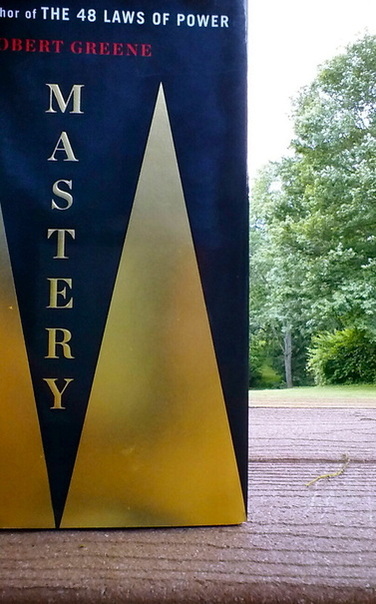
I first picked up Robert Greene's Mastery in November 2012, just a few months after I moved 3,000 miles away from my hometown to southern California for my first real-world job. I had heard about Greene via Ryan Holiday's blog, and then became extremely interested after seeing him on Chase Jarvis Live. I honestly don't know where I would be if I didn't take the next step and read his book. It was a very exciting - and frustrating time for me. I was extremely dissatisfied with certain things going on at work, some involving me and some orbiting around me. But more importantly I wasn't writing fiction regularly. Yes, some of that was stress from work, which made it difficult to switch gears once I came home in the evenings, but some of it was because of my own apprehension toward beginning a new project - and then to compound it - a certain sense of guilt I felt about wasting time. Mastery was a call for me to recommit to writing - by helping me to recall what I wanted most. It was precisely the first step to Mastery that struck home.
Regardless of particular fields, Greene contends that most Masters and creatives discover their "Life's Task" in childhood or adolescence. Whether it was Da Vinci's fascination with flight and nature, Marie Curie's interest in her father's chemistry instruments, Mozart's desire to impress his musically inclined father, or Yoky Matsuoka's love for math and human anatomy, the ideas that take root in us early in life, often affect the direction we grow towards the most.
Check out my more detailed recommendation of it here.
Regardless of particular fields, Greene contends that most Masters and creatives discover their "Life's Task" in childhood or adolescence. Whether it was Da Vinci's fascination with flight and nature, Marie Curie's interest in her father's chemistry instruments, Mozart's desire to impress his musically inclined father, or Yoky Matsuoka's love for math and human anatomy, the ideas that take root in us early in life, often affect the direction we grow towards the most.
Check out my more detailed recommendation of it here.
Fire Bringer by David Clement-Davies
Picked this up on that road trip. I had just finished books 3 & 4 of the HP series and wanted to find something new but in the fantasy genre. The cover was what grabbed my attention. Growing up on two acres of woods and creeks next to a farm meant lots of white-tail deer roaming around, which I would sometimes watch {and chase} at dawn and dusk. They always held a certain ethereal quality the way they would emerge from the trees and then melt into them.
The story is about a young stag born on the night his father is killed by a rival. His hero journey across ancient Scotland with his loved ones brings him in contact with all sorts of animals - and even man. What I love about the story is what I love about Watership Down, the Redwall series, and Aesop'sFables: they're stories about animals that have much to say about what makes us human.
Clement-Davies' command of language enchanted me for the rest of that road trip {I don't think I looked up once from it for the entire length of Kansas!} Since then, I've read it twice, and plan to dive into his other novel, The Sight, about a pack of Transylvanian wolves.
Oh, and here's a couple other fantasy greats worth (re)reading if you're so inclined.
The story is about a young stag born on the night his father is killed by a rival. His hero journey across ancient Scotland with his loved ones brings him in contact with all sorts of animals - and even man. What I love about the story is what I love about Watership Down, the Redwall series, and Aesop'sFables: they're stories about animals that have much to say about what makes us human.
Clement-Davies' command of language enchanted me for the rest of that road trip {I don't think I looked up once from it for the entire length of Kansas!} Since then, I've read it twice, and plan to dive into his other novel, The Sight, about a pack of Transylvanian wolves.
Oh, and here's a couple other fantasy greats worth (re)reading if you're so inclined.
Thomas Jefferson: The Art of Power by Jon Meacham
In Jon Meacham's exceptional biography, Thomas Jefferson: The Art of Power, we meet a man so successful, and learned, and lively, that it's hard for me not to want to return to his world and reread it, and to know where to begin when looking at his contribution to the Enlightment's greatest project: America.
To try to encapsulate everything to be learned from him is probably impossible, but I can start with this brief list of 6 tactics and strategies employed by my favorite Founding Father. Whether you're like Jefferson {a politician with hobbies of all things naturalism and astronomy} an artist, a creative, or you're running a business, I trust we can all benefit from looking at the second President's methods.
To try to encapsulate everything to be learned from him is probably impossible, but I can start with this brief list of 6 tactics and strategies employed by my favorite Founding Father. Whether you're like Jefferson {a politician with hobbies of all things naturalism and astronomy} an artist, a creative, or you're running a business, I trust we can all benefit from looking at the second President's methods.
Beyond Band of Brothers:
The War Memoirs of Major Dick Winters
I love the HBO miniseries Band of Brothers. The protagonist, Major Dick Winters, wrote a memoir after the fact, recounting firsthand his experience leading Easy Company from the night jump before D-Day to V.E. Day. They suffered 150% casualties while liberating Europe, playing crucial roles in pushing the Germans out of France, Operation Market Garden, the Battle of the Bulge, and even liberating a concentration camp.
I took his memoir hiking for a couple of weekends to Montara Beach and Half Moon Bay's North Ridge Trail (pictured above) and was struck and time and time again with his courage, dedication, and plain badassery. To me, Winters embodies the greatest of the Greatest Generation. There was one point, when he and his men — all of whom had been wounded at least once by then — were 100% surrounded by a superior, well-supplied enemy force. In the dead of winter. With barely any ammunition. No way to evacuate wounded comrades. No help on the way.
I put my book down and just sighed. To think that I was complaining an hour before silently in my head about the long line at Chipotle before I could get my burrito (also pictured above), or worried about approaching a colleague regarding disagreement in marketing strategy, or — worst yet — that I'd probably had hundreds if not thousands of these moments where I waste my opportunities in life. Men like Major Winters fought for my freedom and how have I used it?
It's worth asking yourself, and impossible not to after reading this one.
I took his memoir hiking for a couple of weekends to Montara Beach and Half Moon Bay's North Ridge Trail (pictured above) and was struck and time and time again with his courage, dedication, and plain badassery. To me, Winters embodies the greatest of the Greatest Generation. There was one point, when he and his men — all of whom had been wounded at least once by then — were 100% surrounded by a superior, well-supplied enemy force. In the dead of winter. With barely any ammunition. No way to evacuate wounded comrades. No help on the way.
I put my book down and just sighed. To think that I was complaining an hour before silently in my head about the long line at Chipotle before I could get my burrito (also pictured above), or worried about approaching a colleague regarding disagreement in marketing strategy, or — worst yet — that I'd probably had hundreds if not thousands of these moments where I waste my opportunities in life. Men like Major Winters fought for my freedom and how have I used it?
It's worth asking yourself, and impossible not to after reading this one.
Pirate Hunters by Robert Kurson
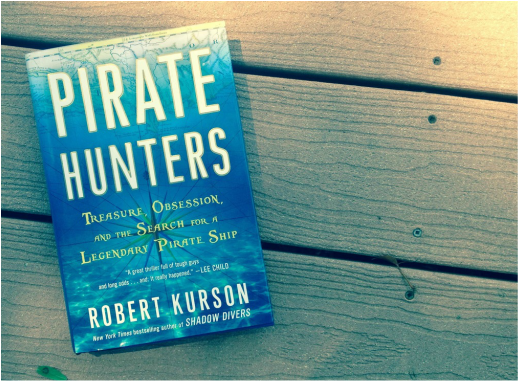
This one I picked up on a whim from the bargain shelf of a shady Walmart in West Chester, PA. The cover stood out from the row of Nicholas Sparks paperbacks, plus I've always had an interest in learning more about pirate history. Johnny Depp roles aside, pirates intrigue and scare me: the adventure and treasure - and the brutality. That same fascination seemed to inspire two treasure hunters, John Chatterton and John Mattera, to pour hundreds of thousands of dollars and countless hours scouring both historical archives in Spain as well as the ocean floor of the Caribbean.
This is a fast read, relentlessly paced that balances both the history of Captain Joseph Bannister and the Golden Fleece with Chatterton's and Mattera's dogged pursuit of its unknown, sunken whereabouts. Bannister was a late 17th Century British Navy Captain who defected to join the pirate life - stealing a ship in the process. I won't give anything away, but I loved the interplay of history, myth, and modernity in the two or three interwoven storylines.
I've heard that Shadow Divers by Robert Kurson is also quite good, which recounts the discovery of a Nazi U-boat derelict off America's east coast!
This is a fast read, relentlessly paced that balances both the history of Captain Joseph Bannister and the Golden Fleece with Chatterton's and Mattera's dogged pursuit of its unknown, sunken whereabouts. Bannister was a late 17th Century British Navy Captain who defected to join the pirate life - stealing a ship in the process. I won't give anything away, but I loved the interplay of history, myth, and modernity in the two or three interwoven storylines.
I've heard that Shadow Divers by Robert Kurson is also quite good, which recounts the discovery of a Nazi U-boat derelict off America's east coast!
Delivering Happiness by Tony Hsieh
Tony Hsieh founded Zappos with a couple of friends in 2000. By 2009, revenue was over 1 billion dollars. The online shoe shop CEO's story of how he got there, from his middle class childhood selling stamps, jokes, magic tricks, and newspapers to selling his first startup, LinkExchange, to Microsoft for 265 million, to then Zappos was a fast read.
As the title suggests, Hsieh views his financial success and personal satisfaction as consequence of providing exceptional customer service. That, Hsieh says, was the core of everything Zappos stood for. It wasn't just a comprehensive online catalog that was easily navigable. It was things like free shipping, free returns, amazing product details for customers to make informed decisions. Anecdotes like the fact that free pizzas were sent to customers regularly, call center representatives stayed on the phone for hours (one talked for 6!) making sure the customer had everything they needed and wanted, and others were insightful and instructive. E-commerce needn't be impersonal. Customer Service isn't an after the fact necessary evil of a business. Happiness and commerce can work and play together.
Here are some gems I highlighted. Some are cliche but that doesn't make them untrue necessarily:
* "I decided to stop chasing the money and start chasing the passion." (54)
* "Be nice and make friends. It's a small community" (66)
* "We view the lifetime value of a customer to be a money target that can increase if we create more and more positive emotional associations with our brand through every interaction that a person has with us." (143)
* Culture and brand as being two sides of the same coin. Every employee at Zappos begins doing 2 weeks of customer service work. Accountants. Marketers. Everyone. Then afterwards they're offered $2,000 to quit. As of the time this book was written only 1% took the money.
* "If you have more than three priorities then you don't have any." - Jim Collins
{JG}
As the title suggests, Hsieh views his financial success and personal satisfaction as consequence of providing exceptional customer service. That, Hsieh says, was the core of everything Zappos stood for. It wasn't just a comprehensive online catalog that was easily navigable. It was things like free shipping, free returns, amazing product details for customers to make informed decisions. Anecdotes like the fact that free pizzas were sent to customers regularly, call center representatives stayed on the phone for hours (one talked for 6!) making sure the customer had everything they needed and wanted, and others were insightful and instructive. E-commerce needn't be impersonal. Customer Service isn't an after the fact necessary evil of a business. Happiness and commerce can work and play together.
Here are some gems I highlighted. Some are cliche but that doesn't make them untrue necessarily:
* "I decided to stop chasing the money and start chasing the passion." (54)
* "Be nice and make friends. It's a small community" (66)
* "We view the lifetime value of a customer to be a money target that can increase if we create more and more positive emotional associations with our brand through every interaction that a person has with us." (143)
* Culture and brand as being two sides of the same coin. Every employee at Zappos begins doing 2 weeks of customer service work. Accountants. Marketers. Everyone. Then afterwards they're offered $2,000 to quit. As of the time this book was written only 1% took the money.
* "If you have more than three priorities then you don't have any." - Jim Collins
{JG}

